26 aug 2019
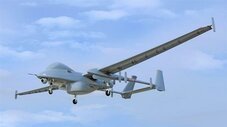
This file picture shows an Israeli IAI Heron medium-altitude long-endurance unmanned aerial vehicle in flight.
Members of pro-government Popular Mobilization Units, better known by the Arabic name Hashd al-Sha’abi, have reportedly intercepted and targeted an unmanned aerial vehicle as it was flying in the skies over a region in the country’s northern province of Nineveh.
The media bureau of the volunteer forces said in a statement that Hashd al-Sha’abi forces shot down the unidentified drone as it was on a reconnaissance mission, and flying for more than 20 minutes over one of their command centers there.
The statement added that the volunteer forces brought down the unmanned aerial vehicle with anti-aircraft guns after ensuring that the aircraft was not of Iraqi origin.
The development came only a few hours after Prime Minister Adel Abdul-Mahdi, President Barham Salih and Parliament Speaker Mohammed al-Halbousi held a meeting in the capital Baghdad with senior commanders of the Hashd al-Sha’abi to discuss measures aimed at protection of Iraq’s security and sovereignty.
They stated that the latest assaults on Hashd al-Sha’abi positions were meant to marginalize the volunteer forces, and strip them of the role in the fight against the Daesh Takfiri terrorist group.
On Sunday, the Iraqi Arabic-language al-Sumaria television network reported that the air defenses of the 50th Brigade of Hashd al-Sha’abi had shot down a spy drone while it was approaching PMU bases in Nineveh.
It was not immediately clear who was operating the drone.
The Iraqi pro-government forces had shot down another spy drone on August 22, as it was flying in the vicinity of the 12th Brigade of Hashd al-Sha’abi and over the outskirts of Baghdad.
Also on Monday, Iraq's military said it has launched an investigation into a purported Israeli strike that killed two Hashd al-Sha’abi fighters near the town of al-Qa’im close to the country's western border with Syria.
“An investigation is ongoing now to determine what happened with the strike,” the spokesman for Iraq's Joint Operations Command, Brigadier General Yahya Rasoul, told AFP.
Sayf al-Badr, spokesman of the Iraqi Health Ministry, said in a statement that at least one person was killed and 29 others were wounded in a powerful explosion, which rocked a military base in southern Baghdad on August 12.
An unnamed source from Iraq’s Interior Ministry said an ammunition warehouse exploded inside a federal police military base, named Falcon, in Owerij area near the southern district of Doura.
Arabic-language al-Ahad TV television network reported on July 19 that a drone had dropped explosives onto a base belonging to the Popular Mobilization Units near the town of Amerli, located about 170 kilometers north of the capital, in the early hours of the day, killing at least one PMU fighter and injuring four others.
Video footage broadcast by Iraqi channels showed a blaze burning at the site and plumes of thick smoke billowing. There was no immediate claim of responsibility for the attack.
Additionally, the Iraqi al-Etejah television network reported that an American B350 reconnaissance plane had flown over the area a few days earlier.
The Israeli regime has a record of attacking the forces fighting Daesh in Syria.
In June 2018, Hashd al-Sha’abi fighters came under attack in Syria’s border town of al-Hari, in the eastern province of Dayr al-Zawr, as they were chasing Daesh terrorists out of the area.
Both the Syrian government and Hashd al-Sha’abi declared back then that the attack near the Iraqi-Syrian border had been deliberate and could only have been carried out by either Israel or the United States.
Members of pro-government Popular Mobilization Units, better known by the Arabic name Hashd al-Sha’abi, have reportedly intercepted and targeted an unmanned aerial vehicle as it was flying in the skies over a region in the country’s northern province of Nineveh.
The media bureau of the volunteer forces said in a statement that Hashd al-Sha’abi forces shot down the unidentified drone as it was on a reconnaissance mission, and flying for more than 20 minutes over one of their command centers there.
The statement added that the volunteer forces brought down the unmanned aerial vehicle with anti-aircraft guns after ensuring that the aircraft was not of Iraqi origin.
The development came only a few hours after Prime Minister Adel Abdul-Mahdi, President Barham Salih and Parliament Speaker Mohammed al-Halbousi held a meeting in the capital Baghdad with senior commanders of the Hashd al-Sha’abi to discuss measures aimed at protection of Iraq’s security and sovereignty.
They stated that the latest assaults on Hashd al-Sha’abi positions were meant to marginalize the volunteer forces, and strip them of the role in the fight against the Daesh Takfiri terrorist group.
On Sunday, the Iraqi Arabic-language al-Sumaria television network reported that the air defenses of the 50th Brigade of Hashd al-Sha’abi had shot down a spy drone while it was approaching PMU bases in Nineveh.
It was not immediately clear who was operating the drone.
The Iraqi pro-government forces had shot down another spy drone on August 22, as it was flying in the vicinity of the 12th Brigade of Hashd al-Sha’abi and over the outskirts of Baghdad.
Also on Monday, Iraq's military said it has launched an investigation into a purported Israeli strike that killed two Hashd al-Sha’abi fighters near the town of al-Qa’im close to the country's western border with Syria.
“An investigation is ongoing now to determine what happened with the strike,” the spokesman for Iraq's Joint Operations Command, Brigadier General Yahya Rasoul, told AFP.
Sayf al-Badr, spokesman of the Iraqi Health Ministry, said in a statement that at least one person was killed and 29 others were wounded in a powerful explosion, which rocked a military base in southern Baghdad on August 12.
An unnamed source from Iraq’s Interior Ministry said an ammunition warehouse exploded inside a federal police military base, named Falcon, in Owerij area near the southern district of Doura.
Arabic-language al-Ahad TV television network reported on July 19 that a drone had dropped explosives onto a base belonging to the Popular Mobilization Units near the town of Amerli, located about 170 kilometers north of the capital, in the early hours of the day, killing at least one PMU fighter and injuring four others.
Video footage broadcast by Iraqi channels showed a blaze burning at the site and plumes of thick smoke billowing. There was no immediate claim of responsibility for the attack.
Additionally, the Iraqi al-Etejah television network reported that an American B350 reconnaissance plane had flown over the area a few days earlier.
The Israeli regime has a record of attacking the forces fighting Daesh in Syria.
In June 2018, Hashd al-Sha’abi fighters came under attack in Syria’s border town of al-Hari, in the eastern province of Dayr al-Zawr, as they were chasing Daesh terrorists out of the area.
Both the Syrian government and Hashd al-Sha’abi declared back then that the attack near the Iraqi-Syrian border had been deliberate and could only have been carried out by either Israel or the United States.

The Palestinian Cabinet, headed by Prime Minister Mohammad Shtayyeh, condemned during its weekly meeting held in Ramallah the US state department deletion of the Palestinian territories from the list of countries on its website.
The cabinet said that this US move confirms the American bias towards Israel, stressing that such move cannot override the Palestinian rights, which the world countries have unanimously recognized.
The cabinet stressed the importance of the upcoming 74th session of the UN General Assembly in mid September, where President Mahmoud Abbas is expected to deliver an important speech before the United Nations Forum, hold bilateral meetings with heads of state, as well as lead the delegation of the Group of 77 and China, which will be held on the sidelines of the United Nations General Assembly session.
The cabinet said that this US move confirms the American bias towards Israel, stressing that such move cannot override the Palestinian rights, which the world countries have unanimously recognized.
The cabinet stressed the importance of the upcoming 74th session of the UN General Assembly in mid September, where President Mahmoud Abbas is expected to deliver an important speech before the United Nations Forum, hold bilateral meetings with heads of state, as well as lead the delegation of the Group of 77 and China, which will be held on the sidelines of the United Nations General Assembly session.
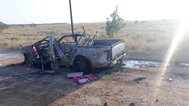
A handout picture released by the Hashd al-Sha'abi shows the wreckage of a vehicle at the site of a drone attack near Iraq's western border with Syria on August 25, 2019
Iraq’s pro-government Popular Mobilization Units, commonly known by the Arabic name Hashd al-Sha’abi, says Israel was behind a recent deadly drone attack that killed two people near the Syrian border.
Two unmanned aircraft carried out air raids on an area about 15 km (9 miles) away from Iraq's border with Syria on Sunday.
"As part of the string of Zionist attacks on Iraq, the evil Israeli crows have returned to target the Hashd al-Sha’abi, this time with two drones inside Iraqi territory," the group said in a statement.
The statement added that the attack left one fighter dead and another seriously wounded. Initial reports said two fighters were killed in the attack, which was carried out under American air cover.
"This blatant attack came with air cover over the area from American planes, in addition to a large balloon to monitor the area near the site of the incident," it said.
Reports said that one of the Sunday’s airstrikes hit the headquarters of a Hashd al-Sha’abi unit, while the other struck a convoy of cars leaving the building.
The air raids are the latest in a series of attacks that have targeted positions of the Hashd al-Sha’abi forces across Iraq over the past months.
The attacks began on July 19 when a drone dropped explosives onto a PMU base near the town of Amerli, in Salahuddin Province, killing at least one resistance fighter and injuring four others.
The fourth attack came last week, when a PMU ammunition depot exploded near the capital Baghdad. Hashd al-Sha'abi commanders soon pointed the finger at Israel and blasted American for allowing the attacks despite having full control over the Iraqi airspace.
The Pentagon has denied involvement, but Israeli Prime Minister Benjamin Netanyahu hinted on Thursday at possible Israeli strikes in Iraq.
"We are operating – not just if needed, we are operating in many areas against a state (Iran) that wants to annihilate us. Of course I gave the security forces a free hand and instructed them to do anything necessary to thwart Iran's plans," he said when asked whether Tel Aviv was considering operations in Iraq.
Unnamed American officials confirmed on Friday that Israel was indeed behind the attacks.
Kata'ib Hezbollah, another prominent Iraqi resistance group, said the recent airstrikes on the positions of PMU are an attempt by the US and Israel to revive the Daesh Takfiri terrorist group in the Arab country.
In an interview with Lebanon's Arabic-language al-Ahed news website published on Friday, Kata'ib Hezbollah spokesman Mohammed Muhyee said the air raids on Hashd al-Sha’abi positions are actually meant to weaken Iraqi resistance factions, empty their weapons stores and end their role in maintaining security in Iraq.
'Final warning'
Last week, Hashd al-Sha'abi 45th brigade issued a "final warning" to the US over the attacks.
"We issue a final warning to the American enemy that any new targeting of any Iraqi positions will be met with a tough, categorical response," it said in a statement.
Forces from the PMU shot down a spy drone in Iraq’s northern Province of Nineveh on Sunday.
In January, US Secretary of State Mike Pompeo hinted during a visit to Iraq that the Israeli regime could launch attacks against Hashd al-Sha’abi forces, who played a key role in the Iraqi army’s counter-terrorism battles against the Daesh terror group and helped the government to rid the country of the Takfiri outfit in late 2017.
Pompeo was reported to have made it clear to Iraqi officials at a meeting with the Iraqi Prime Minister Adel Abdul-Mahdi that Washington would not react to possible Israeli attacks against Hashd al-Sha’abi fighters.
Abdul-Mahdi expressed concern about the statement and warned Pompeo that such actions by Israel would have grave consequences, Russia’s RT Arabic television news network reported back then.
Iraq’s pro-government Popular Mobilization Units, commonly known by the Arabic name Hashd al-Sha’abi, says Israel was behind a recent deadly drone attack that killed two people near the Syrian border.
Two unmanned aircraft carried out air raids on an area about 15 km (9 miles) away from Iraq's border with Syria on Sunday.
"As part of the string of Zionist attacks on Iraq, the evil Israeli crows have returned to target the Hashd al-Sha’abi, this time with two drones inside Iraqi territory," the group said in a statement.
The statement added that the attack left one fighter dead and another seriously wounded. Initial reports said two fighters were killed in the attack, which was carried out under American air cover.
"This blatant attack came with air cover over the area from American planes, in addition to a large balloon to monitor the area near the site of the incident," it said.
Reports said that one of the Sunday’s airstrikes hit the headquarters of a Hashd al-Sha’abi unit, while the other struck a convoy of cars leaving the building.
The air raids are the latest in a series of attacks that have targeted positions of the Hashd al-Sha’abi forces across Iraq over the past months.
The attacks began on July 19 when a drone dropped explosives onto a PMU base near the town of Amerli, in Salahuddin Province, killing at least one resistance fighter and injuring four others.
The fourth attack came last week, when a PMU ammunition depot exploded near the capital Baghdad. Hashd al-Sha'abi commanders soon pointed the finger at Israel and blasted American for allowing the attacks despite having full control over the Iraqi airspace.
The Pentagon has denied involvement, but Israeli Prime Minister Benjamin Netanyahu hinted on Thursday at possible Israeli strikes in Iraq.
"We are operating – not just if needed, we are operating in many areas against a state (Iran) that wants to annihilate us. Of course I gave the security forces a free hand and instructed them to do anything necessary to thwart Iran's plans," he said when asked whether Tel Aviv was considering operations in Iraq.
Unnamed American officials confirmed on Friday that Israel was indeed behind the attacks.
Kata'ib Hezbollah, another prominent Iraqi resistance group, said the recent airstrikes on the positions of PMU are an attempt by the US and Israel to revive the Daesh Takfiri terrorist group in the Arab country.
In an interview with Lebanon's Arabic-language al-Ahed news website published on Friday, Kata'ib Hezbollah spokesman Mohammed Muhyee said the air raids on Hashd al-Sha’abi positions are actually meant to weaken Iraqi resistance factions, empty their weapons stores and end their role in maintaining security in Iraq.
'Final warning'
Last week, Hashd al-Sha'abi 45th brigade issued a "final warning" to the US over the attacks.
"We issue a final warning to the American enemy that any new targeting of any Iraqi positions will be met with a tough, categorical response," it said in a statement.
Forces from the PMU shot down a spy drone in Iraq’s northern Province of Nineveh on Sunday.
In January, US Secretary of State Mike Pompeo hinted during a visit to Iraq that the Israeli regime could launch attacks against Hashd al-Sha’abi forces, who played a key role in the Iraqi army’s counter-terrorism battles against the Daesh terror group and helped the government to rid the country of the Takfiri outfit in late 2017.
Pompeo was reported to have made it clear to Iraqi officials at a meeting with the Iraqi Prime Minister Adel Abdul-Mahdi that Washington would not react to possible Israeli attacks against Hashd al-Sha’abi fighters.
Abdul-Mahdi expressed concern about the statement and warned Pompeo that such actions by Israel would have grave consequences, Russia’s RT Arabic television news network reported back then.
23 aug 2019
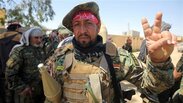
In this file photo, members of the Iraqi pro-government Popular Mobilization Units (Hashd al-Sha’abi) gesture from the modern town of Hatra southwest of the northern city of Mosul
Iraqi Vice President Nouri al-Maliki has warned of a “strong response” if it is proven that the Israeli regime was behind recent airstrikes in the country against the positions of pro-government Popular Mobilization Units (PMU).
Maliki, who is also secretary-general of the Islamic Dawa Party, said on Friday that if Israel continues to target Iraq, the country “will transform into a battle arena that drags in multiple countries, including Iran.”
He added that “the security of the region, which Iraq is a key part of, is a collective issue, and its protection requires the (full) responsibility of all countries.”
“The security of the region will be put in danger and the status quo will change if it is proven that Israel has targeted the sovereignty of Iraq. Iraq will give a strong response in case it is verified that Israel's hand is behind the recent attacks,” the former Iraqi prime minister said.
Also on Friday, Karim Alaiwi, a member of the Security and Defense Committee in the Iraqi Parliament, told Iraq’s Arabic-language al-Ahad television network that “the Iraqi government’s position on targeting the PMU headquarters is vague and unclear.”
He added that Thursday’s meeting between Prime Minister Adel Abdul-Mahdi, President Barham Salih and Parliament Speaker Mohammed al-Halbousi in the capital Baghdad to discuss the latest attacks on the bases of the Popular Mobilization Units did not bear fruit as it failed to assure the nation that such assault would not be repeated again.
Separately, the Iraqi National Security Council convened a session on Friday to discuss plans and measures aimed at arming the country’s air defense command in the face of recent challenges.
The Council ruled that the Baghdad government bears responsibility for protecting all types of military forces, including Hashd al-Sha’abi.
Moreover, Iraqi Foreign Minister Mohamed Ali Alhakim summoned Deputy Chief of the US Embassy in Baghdad Brian McFeeters to call on Washington to abide by the terms of its strategic partnership agreement with Iraq as regards joint security and economic cooperation.
Hakim highlighted that the Baghdad government places all diplomatic and legal options at the forefront of its priorities to prevent any external interference in its internal affairs, and to safeguard the security and sovereignty of Iraq and its people.
On Wednesday, the second-in-command of the Popular Mobilization Units, Abu Mahdi al-Muhandis, held the United States fully responsible for recent attacks on the volunteer forces.
He said in a statement that the US, which has contributed to the emergence of terrorist groups in the Middle East, is now considering various ways to violate Iraq’s sovereignty and targeting the PMU.
“We have accurate and credible information that Americans brought in four Israeli drones this year via Azerbaijan to operate within the US fleet to carry out sorties aimed at Iraqi military headquarters. We also have other information, maps and recordings of all types of American aircraft, when they took off, when they landed and the number of hours they flew,” Muhandis (pictured below) said.
Iraqi Vice President Nouri al-Maliki has warned of a “strong response” if it is proven that the Israeli regime was behind recent airstrikes in the country against the positions of pro-government Popular Mobilization Units (PMU).
Maliki, who is also secretary-general of the Islamic Dawa Party, said on Friday that if Israel continues to target Iraq, the country “will transform into a battle arena that drags in multiple countries, including Iran.”
He added that “the security of the region, which Iraq is a key part of, is a collective issue, and its protection requires the (full) responsibility of all countries.”
“The security of the region will be put in danger and the status quo will change if it is proven that Israel has targeted the sovereignty of Iraq. Iraq will give a strong response in case it is verified that Israel's hand is behind the recent attacks,” the former Iraqi prime minister said.
Also on Friday, Karim Alaiwi, a member of the Security and Defense Committee in the Iraqi Parliament, told Iraq’s Arabic-language al-Ahad television network that “the Iraqi government’s position on targeting the PMU headquarters is vague and unclear.”
He added that Thursday’s meeting between Prime Minister Adel Abdul-Mahdi, President Barham Salih and Parliament Speaker Mohammed al-Halbousi in the capital Baghdad to discuss the latest attacks on the bases of the Popular Mobilization Units did not bear fruit as it failed to assure the nation that such assault would not be repeated again.
Separately, the Iraqi National Security Council convened a session on Friday to discuss plans and measures aimed at arming the country’s air defense command in the face of recent challenges.
The Council ruled that the Baghdad government bears responsibility for protecting all types of military forces, including Hashd al-Sha’abi.
Moreover, Iraqi Foreign Minister Mohamed Ali Alhakim summoned Deputy Chief of the US Embassy in Baghdad Brian McFeeters to call on Washington to abide by the terms of its strategic partnership agreement with Iraq as regards joint security and economic cooperation.
Hakim highlighted that the Baghdad government places all diplomatic and legal options at the forefront of its priorities to prevent any external interference in its internal affairs, and to safeguard the security and sovereignty of Iraq and its people.
On Wednesday, the second-in-command of the Popular Mobilization Units, Abu Mahdi al-Muhandis, held the United States fully responsible for recent attacks on the volunteer forces.
He said in a statement that the US, which has contributed to the emergence of terrorist groups in the Middle East, is now considering various ways to violate Iraq’s sovereignty and targeting the PMU.
“We have accurate and credible information that Americans brought in four Israeli drones this year via Azerbaijan to operate within the US fleet to carry out sorties aimed at Iraqi military headquarters. We also have other information, maps and recordings of all types of American aircraft, when they took off, when they landed and the number of hours they flew,” Muhandis (pictured below) said.
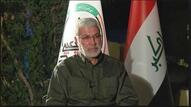
“Instead of chasing Daesh terrorists, US military aircraft are collecting information and data concerning the brigades of the Popular Mobilization Units, and their warehouses and arms depots,” the statement read.
Sayf al-Badr, spokesman of the Iraqi Health Ministry, said in a statement that at least one person was killed and 29 others were wounded in a powerful explosion, which rocked a military base in southern Baghdad on August 12.
An unnamed source from Iraq’s Interior Ministry said an ammunition warehouse exploded inside a federal police military base, named Falcon, in Owerij area near the southern district of Doura.
Arabic-language al-Ahad TV television network reported on July 19 that a drone had dropped explosives onto a base belonging to the Popular Mobilization Units near the town of Amerli, located about 170 kilometers north of the capital, in the early hours of the day, killing at least one PMU fighter and injuring four others.
Video footage broadcast by Iraqi channels showed a blaze burning at the site and plumes of thick smoke billowing. There was no immediate claim of responsibility for the attack.
Additionally, the Iraqi al-Etejah television network reported that an American B350 reconnaissance plane had flown over the area a few days earlier.
Sayf al-Badr, spokesman of the Iraqi Health Ministry, said in a statement that at least one person was killed and 29 others were wounded in a powerful explosion, which rocked a military base in southern Baghdad on August 12.
An unnamed source from Iraq’s Interior Ministry said an ammunition warehouse exploded inside a federal police military base, named Falcon, in Owerij area near the southern district of Doura.
Arabic-language al-Ahad TV television network reported on July 19 that a drone had dropped explosives onto a base belonging to the Popular Mobilization Units near the town of Amerli, located about 170 kilometers north of the capital, in the early hours of the day, killing at least one PMU fighter and injuring four others.
Video footage broadcast by Iraqi channels showed a blaze burning at the site and plumes of thick smoke billowing. There was no immediate claim of responsibility for the attack.
Additionally, the Iraqi al-Etejah television network reported that an American B350 reconnaissance plane had flown over the area a few days earlier.

The aftermath of an airstrike on a weapons depot in Iraq
New York Times says 'cargo of guided missiles with a range of 125 miles' was destroyed in July 19 airstrike on base used by Revolutionary Guards to transfer arms to Syria
Israel conducted at least one airstrike on a weapons depot in Iraq that American officials say was used by Iran to transfer weapons to Syria, the New York Times reported late Thursday.
The report cited Middle Eastern and American officials.
A series of blasts in the past few weeks have hit weapon depots and bases belonging to paramilitary groups in Iraq, many of them backed by Israel's regional foe Iran.
The groups blamed the United States and Israel for the blasts on Wednesday.
The Times specifies a July 19 attack on a base near Baghdad that an unnamed "Middle East intelligence official" said was used by the Iranian Revolutionary Guards to move the weapons. The attack, which was reportedly launched from inside Iraq, destroyed "a cargo of guided missiles with a range of 125 miles."
The report said that an Iraqi military official confirmed a base was hit, killing three people – including one Iranian.
The NYT quoted a senior American official as saying that "Israel was pushing the limits" by striking targets in Iraq and that such action could result the U.S. Army having to leave its bases in the country.
The Iraqi government on Thursday avoided attributing the strikes to any country, with Iraqi national security adviser Falih al-Fayadh saying Baghdad did not wish to take sides in any conflict between Iran and other countries.
Meanwhile, Prime Minister Benjamin Netanyahu hinted Thursday of possible Israeli involvement in attacks against Iranian-linked targets in Iraq.
In an interview with Russian-language Israeli television Channel 9, broadcast on Thursday, Netanyahu was asked whether Israel would operate against Iranian targets in Iraq if needed, he said:
"We are operating - not just if needed, we are operating in many areas against a state that wants to annihilate us. Of course I gave the security forces a free hand and instructed them to do anything necessary to thwart Iran's plans."
Netanyahu did not directly name Iraq as one of those areas.
Israel says it has carried out hundreds of strikes in Syria, some of them against Iranian targets, to prevent Teheran from establishing a permanent military presence there and to stop advanced weapons reaching its proxies in the area.
Israeli officials suggested recently they viewed Iraq, whose main ally is Iran, as more of a threat than in recent years, but have not directly commented on the recent blasts at Popular Mobilization Forces (PMF) sites in Iraq.
On Wednesday, the PMF, the umbrella grouping of Iraq's mostly Shi'ite Muslim paramilitary groups, said the United States had allowed four Israeli drones to enter the region accompanying U.S. forces and carry out missions on Iraqi territory.
The Pentagon denied involvement.
The U.S.-led coalition, in Iraq to fight remnants of the Islamic State group, dismissed the statement.
As tensions between Washington and Tehran increase, Iraq finds itself caught between neighboring Iran, whose regional influence has grown in recent years, and the United States.
Iraqi Prime Minister Adel Abdul Mahdi last week ordered all ammunition dumps belonging to the armed forces or paramilitary groups to be moved outside of cities.
New York Times says 'cargo of guided missiles with a range of 125 miles' was destroyed in July 19 airstrike on base used by Revolutionary Guards to transfer arms to Syria
Israel conducted at least one airstrike on a weapons depot in Iraq that American officials say was used by Iran to transfer weapons to Syria, the New York Times reported late Thursday.
The report cited Middle Eastern and American officials.
A series of blasts in the past few weeks have hit weapon depots and bases belonging to paramilitary groups in Iraq, many of them backed by Israel's regional foe Iran.
The groups blamed the United States and Israel for the blasts on Wednesday.
The Times specifies a July 19 attack on a base near Baghdad that an unnamed "Middle East intelligence official" said was used by the Iranian Revolutionary Guards to move the weapons. The attack, which was reportedly launched from inside Iraq, destroyed "a cargo of guided missiles with a range of 125 miles."
The report said that an Iraqi military official confirmed a base was hit, killing three people – including one Iranian.
The NYT quoted a senior American official as saying that "Israel was pushing the limits" by striking targets in Iraq and that such action could result the U.S. Army having to leave its bases in the country.
The Iraqi government on Thursday avoided attributing the strikes to any country, with Iraqi national security adviser Falih al-Fayadh saying Baghdad did not wish to take sides in any conflict between Iran and other countries.
Meanwhile, Prime Minister Benjamin Netanyahu hinted Thursday of possible Israeli involvement in attacks against Iranian-linked targets in Iraq.
In an interview with Russian-language Israeli television Channel 9, broadcast on Thursday, Netanyahu was asked whether Israel would operate against Iranian targets in Iraq if needed, he said:
"We are operating - not just if needed, we are operating in many areas against a state that wants to annihilate us. Of course I gave the security forces a free hand and instructed them to do anything necessary to thwart Iran's plans."
Netanyahu did not directly name Iraq as one of those areas.
Israel says it has carried out hundreds of strikes in Syria, some of them against Iranian targets, to prevent Teheran from establishing a permanent military presence there and to stop advanced weapons reaching its proxies in the area.
Israeli officials suggested recently they viewed Iraq, whose main ally is Iran, as more of a threat than in recent years, but have not directly commented on the recent blasts at Popular Mobilization Forces (PMF) sites in Iraq.
On Wednesday, the PMF, the umbrella grouping of Iraq's mostly Shi'ite Muslim paramilitary groups, said the United States had allowed four Israeli drones to enter the region accompanying U.S. forces and carry out missions on Iraqi territory.
The Pentagon denied involvement.
The U.S.-led coalition, in Iraq to fight remnants of the Islamic State group, dismissed the statement.
As tensions between Washington and Tehran increase, Iraq finds itself caught between neighboring Iran, whose regional influence has grown in recent years, and the United States.
Iraqi Prime Minister Adel Abdul Mahdi last week ordered all ammunition dumps belonging to the armed forces or paramilitary groups to be moved outside of cities.
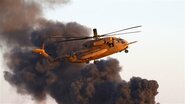
An Israeli Sikorsky CH-53 Sea Stallion helicopter takes part in a military exercise at the Hatzerim base in the Negev desert on June 27, 2019
The Israeli military is planning to attack Yemen's Houthi Ansarullah movement, a new report says, a move that is claimed to be part of the Tel Aviv regime's attempts to ensure the group never comes in contact with Iran.
The Kuwaiti newspaper al-Jaridah said Thursday that Israel was gearing up to pound targets of the Ansarullah and Lebanon's Hezbollah resistance movement in Yemen, near the Straits of Bab-el-Mandeb separating the Red Sea from the Gulf of Aden.
The report claimed that the Israeli spy agency Mossad as well as the regime's Military Intelligence were specifically looking for alleged attempts to deliver weapons from Iran.
It further claimed that some of the Houthis' drones and missiles had been transferred to Iraq instead in an alleged attempt to mislead the Israeli military, which is said to be behind a series of bombings that have targeted Iraqi popular mobilization forces, Hashd al-Sha'abi, over the past weeks.
According to al-Jarida and some Iraqi experts, the attacks on the group's ammunition depots across Iraq have been carried out by Israel.
This falls in line with remarks by Israeli Prime Minister Benjamin Netanyahu, who did not reject a reporter's questions about whether Tel Aviv was operating in Iraq .
"We are working against Iranian consolidation - in Iraq as well," he said in an interview with Israel's Channel 9 News broadcast on Thursday.
On Tuesday, several powerful explosions rocked an ammunition warehouse next to Balad air base, which hosts US forces and contractors north of the capital Baghdad.
Abu Mahdi al-Muhandis, second-in-command of the Hashd al-Sha'abi, said after the attacks that the United States and Israel were responsible for the attacks.
“We have accurate and credible information that Americans brought in four Israeli drones this year via Azerbaijan to operate within the US fleet to carry out sorties aimed at Iraqi military headquarters" he said.
Karim Alaiwi, a member of the Security and Defense Committee in the Iraqi Parliament, also accused Israel of carrying out the attacks in an attempt to "weaken the force."
The al-Jaridah's sources confirmed to the paper that Israel was sharing military intelligence and target with Arab states that have ports in the region.
The US had also been informed on the operations and was closely following latest developments about the alleged weapons shipments.
Iran, earlier this month, hosted a Houthi delegation who met with Leader of the Islamic Revolution Ayatollah Seyyed Ali Khamenei and delivered a letter from the group's movement, Abdul-Malik al-Houthi.
Tehran and the Houthis, however, have rejected claims of Iran transferring weapons to Yemem, arguing that such shipments are virtually impossible due to a years-long aerial and maritime blockade on Yemen by Saudi Arabia and the United Arab Emirates that have been leading a deadly war against the impoverished country since March 2015.
The Israeli military is planning to attack Yemen's Houthi Ansarullah movement, a new report says, a move that is claimed to be part of the Tel Aviv regime's attempts to ensure the group never comes in contact with Iran.
The Kuwaiti newspaper al-Jaridah said Thursday that Israel was gearing up to pound targets of the Ansarullah and Lebanon's Hezbollah resistance movement in Yemen, near the Straits of Bab-el-Mandeb separating the Red Sea from the Gulf of Aden.
The report claimed that the Israeli spy agency Mossad as well as the regime's Military Intelligence were specifically looking for alleged attempts to deliver weapons from Iran.
It further claimed that some of the Houthis' drones and missiles had been transferred to Iraq instead in an alleged attempt to mislead the Israeli military, which is said to be behind a series of bombings that have targeted Iraqi popular mobilization forces, Hashd al-Sha'abi, over the past weeks.
According to al-Jarida and some Iraqi experts, the attacks on the group's ammunition depots across Iraq have been carried out by Israel.
This falls in line with remarks by Israeli Prime Minister Benjamin Netanyahu, who did not reject a reporter's questions about whether Tel Aviv was operating in Iraq .
"We are working against Iranian consolidation - in Iraq as well," he said in an interview with Israel's Channel 9 News broadcast on Thursday.
On Tuesday, several powerful explosions rocked an ammunition warehouse next to Balad air base, which hosts US forces and contractors north of the capital Baghdad.
Abu Mahdi al-Muhandis, second-in-command of the Hashd al-Sha'abi, said after the attacks that the United States and Israel were responsible for the attacks.
“We have accurate and credible information that Americans brought in four Israeli drones this year via Azerbaijan to operate within the US fleet to carry out sorties aimed at Iraqi military headquarters" he said.
Karim Alaiwi, a member of the Security and Defense Committee in the Iraqi Parliament, also accused Israel of carrying out the attacks in an attempt to "weaken the force."
The al-Jaridah's sources confirmed to the paper that Israel was sharing military intelligence and target with Arab states that have ports in the region.
The US had also been informed on the operations and was closely following latest developments about the alleged weapons shipments.
Iran, earlier this month, hosted a Houthi delegation who met with Leader of the Islamic Revolution Ayatollah Seyyed Ali Khamenei and delivered a letter from the group's movement, Abdul-Malik al-Houthi.
Tehran and the Houthis, however, have rejected claims of Iran transferring weapons to Yemem, arguing that such shipments are virtually impossible due to a years-long aerial and maritime blockade on Yemen by Saudi Arabia and the United Arab Emirates that have been leading a deadly war against the impoverished country since March 2015.

US President Donald Trump has scrapped a plan to freeze more than $4 billion in foreign aid funding disapproved by Congress.
Trump, who had described foreign aid as wasteful spending and wanted to cancel the already-appropriated funds without congressional approval, dropped a planned rescission package on Thursday.
Treasury Secretary Steven Mnuchin, Secretary of State Mike Pompeo and several GOP lawmakers had warned Trump against the move saying it would be detrimental to national security.
In a letter Friday, House Speaker Nancy Pelosi said the foreign aid cuts Trump had been pursuing violated “the good faith” of that bipartisan deal-making.
Senate Minority Leader Chuck Schumer said on Twitter that he hoped Trump "learned the lesson not to play games with the budget."
However, the president’s acting budget director, Russ Vought, and acting chief of staff Mick Mulvaney had both urged Trump to go ahead with the planned aid cut.
Israel is the largest recipient of US foreign aid funding, receiving nearly $3 billion in grants each year.
US lawmakers opposed to the spending urged a stop to US foreign aid to Israel.
On Monday, Muslim Congresswoman Rashida Tlaib called on the the Trump administration and Congress to reconsider the budget spent on the Tel Aviv regime.
She said the billions of dollars of US aid to Israel, which is engaged in oppression of the Palestinian people, should be cut.
Trump, who had described foreign aid as wasteful spending and wanted to cancel the already-appropriated funds without congressional approval, dropped a planned rescission package on Thursday.
Treasury Secretary Steven Mnuchin, Secretary of State Mike Pompeo and several GOP lawmakers had warned Trump against the move saying it would be detrimental to national security.
In a letter Friday, House Speaker Nancy Pelosi said the foreign aid cuts Trump had been pursuing violated “the good faith” of that bipartisan deal-making.
Senate Minority Leader Chuck Schumer said on Twitter that he hoped Trump "learned the lesson not to play games with the budget."
However, the president’s acting budget director, Russ Vought, and acting chief of staff Mick Mulvaney had both urged Trump to go ahead with the planned aid cut.
Israel is the largest recipient of US foreign aid funding, receiving nearly $3 billion in grants each year.
US lawmakers opposed to the spending urged a stop to US foreign aid to Israel.
On Monday, Muslim Congresswoman Rashida Tlaib called on the the Trump administration and Congress to reconsider the budget spent on the Tel Aviv regime.
She said the billions of dollars of US aid to Israel, which is engaged in oppression of the Palestinian people, should be cut.
Page: 37 - 36 - 35 - 34 - 33 - 32 - 31 - 30 - 29 - 28 - 27 - 26 - 25 - 24 - 23 - 22 - 21 - 20 - 19 - 18 - 17 - 16
